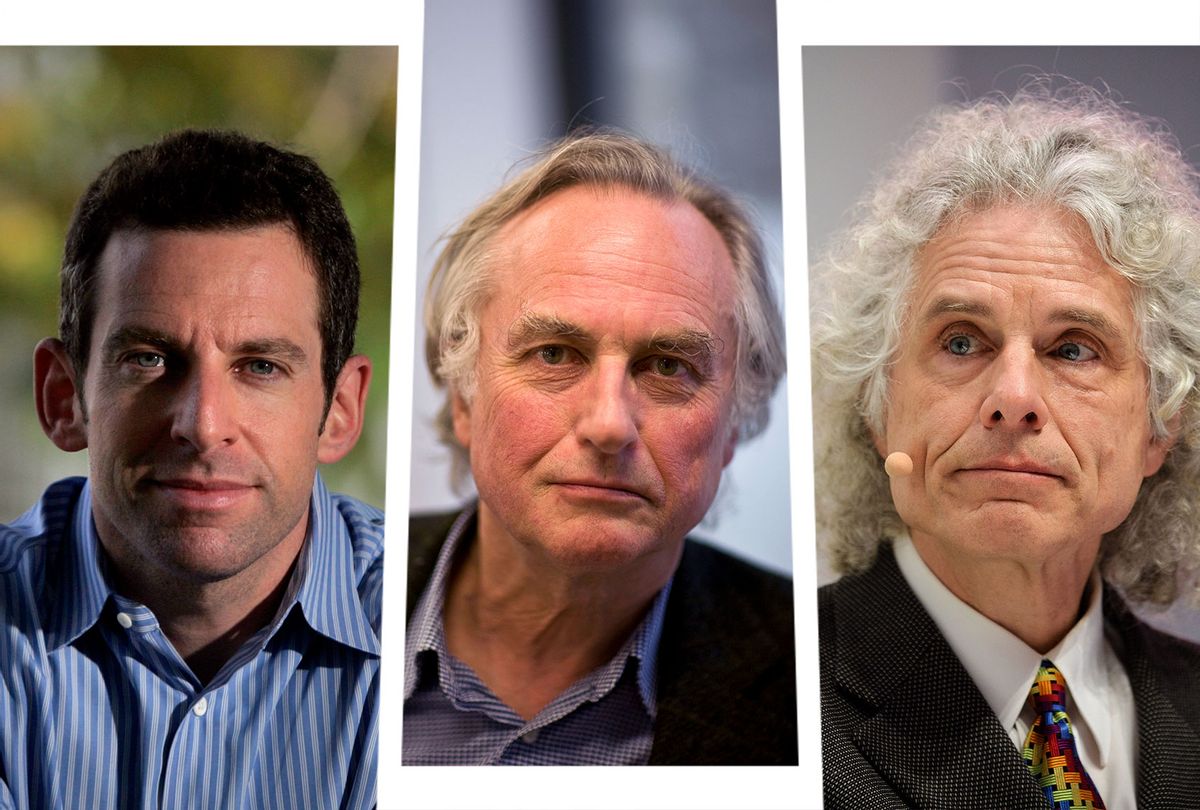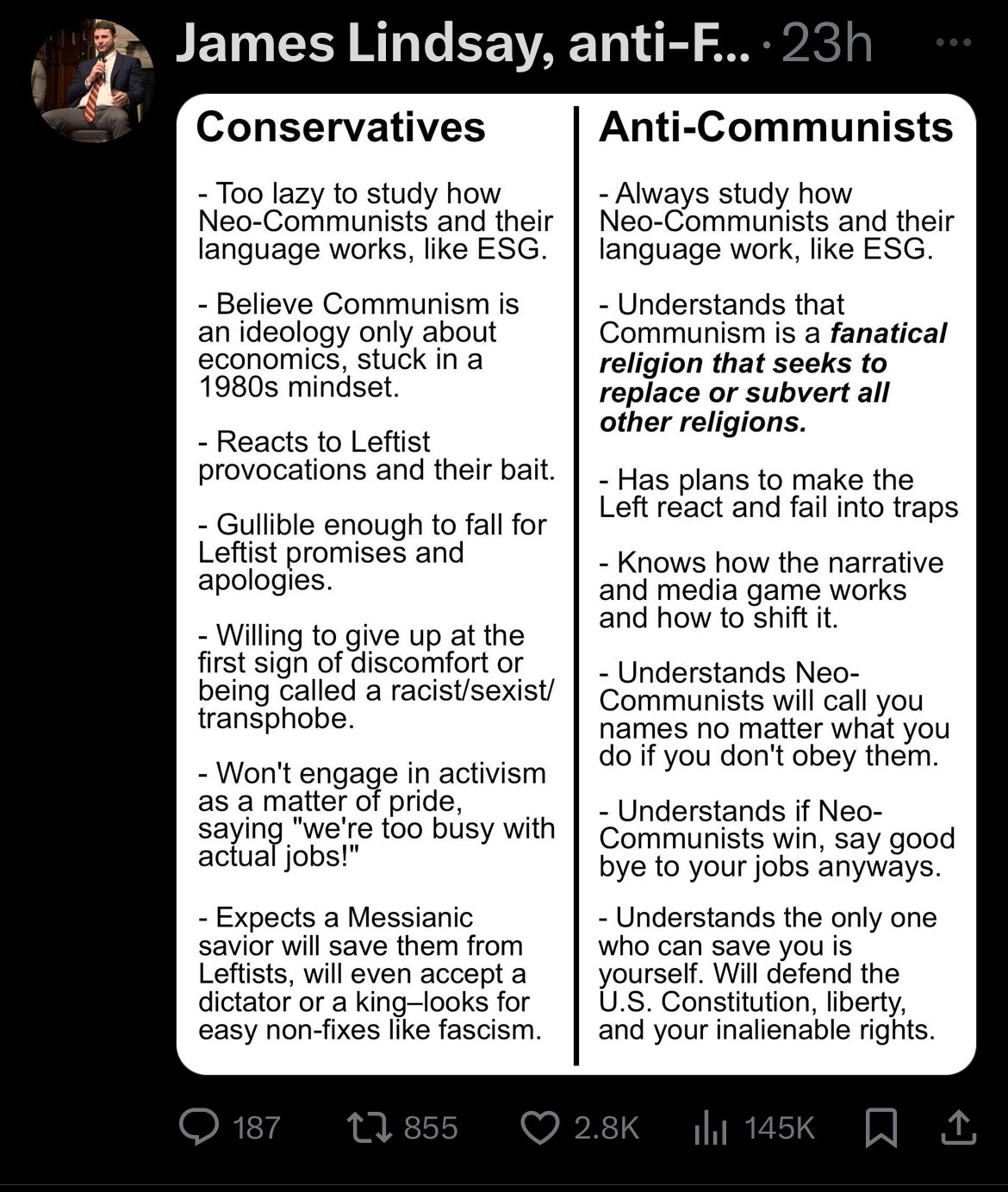Petr
Administrator
To put a long story short, the 2000s "New Atheism" was mostly just a rage-reaction of Blue America to the election of George W. Bush, who was perceived to be a standard-bearer of the Religious Right. It began to wither away in the Obama era, and became irrelevant once the Trump movement had entered the scene.
Back in those days, even some quite right-wing White heterosexual males could pretend to be edgy by attacking religion (as even Fade the Butcher did in one of his phases), but now that the Left is becoming more and more openly anti-White, pale-skinned infidels like Richard Dawkins are no longer hip or welcome in the radical Progressive scene:
https://slatestarcodex.com/2019/10/3...s-that-failed/
New Atheism: The Godlessness That Failed
Thucydides predicted that future generations would underestimate the power of Sparta. It built no great temples, left no magnificent ruins. Absent any tangible signs of the sway it once held, memories of its past importance would sound like ridiculous exaggerations.
This is how I feel about New Atheism.
If I were to describe the power of New Atheism over online discourse to a teenager, they would never believe me. Why should they? Other intellectual movements have left indelible marks in the culture; the heyday of hippiedom may be long gone, but time travelers visiting 1969 would not be surprised by the extent of Woodstock. But I imagine the same travelers visiting 2005, logging on to the Internet, and holy @#$! that’s a lot of atheism-related discourse what is going on here?
My first forays onto the Internet were online bulletin boards about computer games. They would have a lot of little forums about various aspects of the games, plus two off-topic forums. One for discussion of atheism vs. religion. And the other for everything else. This was a common structure for websites in those days. You had to do it, or the atheism vs. religion discussions would take over everything. At the time, this seemed perfectly normal.
In 2005, a college student made a webpage called The Church Of The Flying Spaghetti Monster. It was a joke based on the idea that there was no more scientific evidence for God or creationism than for belief in a flying spaghetti monster. The monster’s website received tens of millions of visitors, 60,000 emails (“about 95 percent” supportive), and was covered in The New York Times, The Washington Post, and The Daily Telegraph. Six publishing companies entered a bidding war for the rights to the spaghetti monster’s “gospel”, with the winner, Random House, offering an $80,000 advance. The book was published to massive fanfare, sold over 100,000 copies, and was translated into multiple languages. Putin’s thugs broke up a pro-Flying-Spaghetti-Monster demonstration in Russia. At the time, this seemed perfectly normal.
People compiled endless lists of arguments and counterarguments for or against atheism. The Talk.Origins newsgroup created a Dewey-Decimal-system-esque index of almost a thousand creationist arguments, from CA211.1 (“Karl Popper said that Darwinism is not testable”), to CD011.1 (“Variable C-14/C-12 ratio invalidates carbon dating”), through CH508 (“Chinese treasure ships show Noah’s Ark was feasible”) – and painstakingly debunked all of them; in case that wasn’t enough they linked 133 other sites doing similar work. Their arch-enemies, creationist site True.Origin, then went through and debunked all of their debunkings. Another atheist group created the Skeptics’ Annotated Bible, a version of the Bible highlighting everything bad or wrong in it. For example, if for some reason you need a hit job on the second chapter of the Book of Malachi in particular, you can look up its SAB page and find that Malachi 2:11 castigates Judah for “marrying the daughter of a strange god” (which is intolerant), Malachi 2:17 accuses the Israelites of “wearying the Lord with your words”, (which is absurd since God cannot be wearied), and Malachi 2:3 says that God will spread dung upon the faces of unbelievers (which is gross). This last entry includes a link to a 2007 YouTube video “God Wants To Smear Dung On Your Face” with 21,947 views. And the video links to a store selling Malachi-2:3-says-God-wants to-put-dung-on-your-face-related t-shirts, bumper stickers, keychains, and coffee mugs. At the time, this seemed perfectly normal.
Whatever media you liked, there were atheism-themed versions of it. Obviously if you liked webcomics you would never be able to finish all the different atheist options from Russell’s Teapot through Jesus & Mo through The Sheeples. If you liked TV, there were atheist TV shows like John Safran vs. God or The Atheist Experience. If you liked pithy quotes, you could read the top 10,000 atheist quotations in order of popularity. If you just liked discussion, you could go to the now-infamous r/atheism subreddit, which at the time was one of Reddit’s highest-ranked, beating topics like “news”, “humor”, and – somehow – “sex”. At the time, this seemed perfectly normal.
But these still don’t quite make my point, because the defining feature of this period wasn’t just that there were a lot of atheism-focused things. It was how the religious-vs-atheist conflict subtly bled into everything. Read enough old articles and blogs from this period and you’ll spot it. Some travel writer going on about how the boring small town he ended up in is probably full of fundies who hate gays and think the Earth is six thousand years old. Some logician giving an example of circular arguments: “I know the Bible is true because it says so in the Bible.” Some political writer saying a stupid policy is only to be expected in a country where X% of people still get their ethics from Bronze Age superstitions. At the time, this seemed perfectly normal.
It seemed perfectly normal because religion vs. atheism was the most important issue, maybe the only issue. How could you run a 21st century democracy with half the population believing in science and compassion, and the other half believing whatever they read in a 3000 year old book about a magic sky father? To truly understand the spirit of the time, you can’t just think of religion as evil. You have to think of it as the ur-evil, without which no other evil would exist. Homophobia? Only there because the Bible says to stone gay people. War? It’s all holy war of one sort or another, whether it’s Arabs vs. Israelis, Sunnis vs. Shias, or the Christian/Muslim “clash of civilizations”. Environmental devastation? Only there because religious people believe God elevated Adam over the animals and told him to exploit them for his own purposes. Poverty? Only because religious people believe in the prosperity gospel that says people get what they deserve.
Christopher Hitchens, 2008:
Where did this come from? And where did it go?
At the time, the question of where it came from seemed to have an obvious answer. As a civilization becomes advanced enough that some people throw off the yoke of religion, they will naturally come into conflict with people who have not thrown off that yoke. This will dominate discussion since atheism vs. religion is obviously the most important issue and maybe the only issue, and last until the civilization advances enough that religion disappears.
But the past decade or so has shown that advanced civilizations are perfectly capable of containing atheists and religious people in close proximity without either side caring that much about it. So what made the turn of the millennium such an acrimonious period?
As for where it went, I asked that question last year and got various responses. The most popular was that 9/11 made religion-bashing segue into Islam-bashing, which started to look pretty racist. But 9/11 happened in 2001, The God Delusion wasn’t published until 2006, and New Atheism didn’t peak until the early 2010s. Why?
In order to answer these questions, I’ll start by presenting some data confirming the picture I paint above and trying to pinpoint exactly when the peak and the beginning of the end happened. I’ll move on to some of the intellectual subtrends in New Atheism that might explain the picture a little better. And finally, I’ll present my theory explaining the mysteries above: New Atheism was a failed hamartiology.
II.
Here is a graph of US religiosity over time:
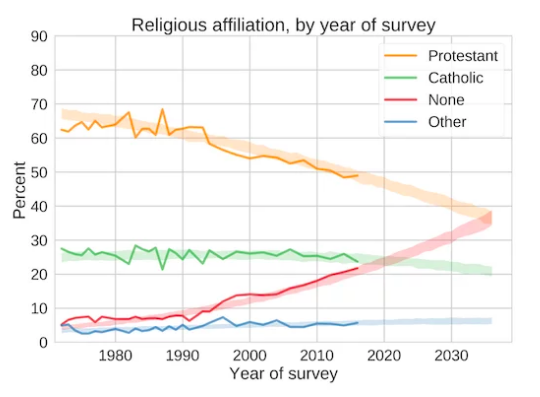
Between the first stirrings of internet atheism in 2000 and the beginning of the end in 2015, the percent of Americans identifying as Christian dropped about 10%; the percent identifying as no religion increased about the same amount. There are many different ways of looking at the data: self-reported affiliation, church attendance, even polls on whether religion can answer all of today’s problems, but they all show the same story of slow, steady decline.
By the numbers, the decline is slight: from 80% Christian / 15% atheist in 2000 to 70% Christian / 25% atheist in 2018. This could hide wider social changes. The number of gay people has barely changed since 2000, but society’s attitude toward them has totally transformed. Likewise, although religion has barely declined, and nonbelief barely risen, Christianity no longer seems to command quite the same level of political power, nor does atheism provoke quite as much revulsion.
But the sudden fall of New Atheism didn’t feel like a process of gradual social change and eventual acceptance. It felt like a movement certain of its own victory burning out spectacularly over the course of a few short years, followed by mysterious yet near-total contempt from the very people it thought it had convinced.
Here are some graphs of atheism-related search terms on Google Trends since 2004:
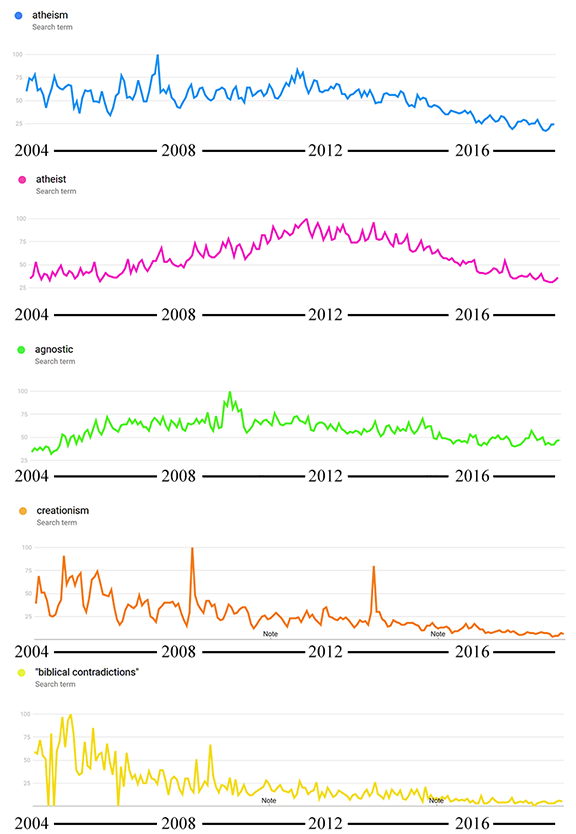
And here are the traffic numbers for some atheism-related websites (source: http://rank2traffic.com/):
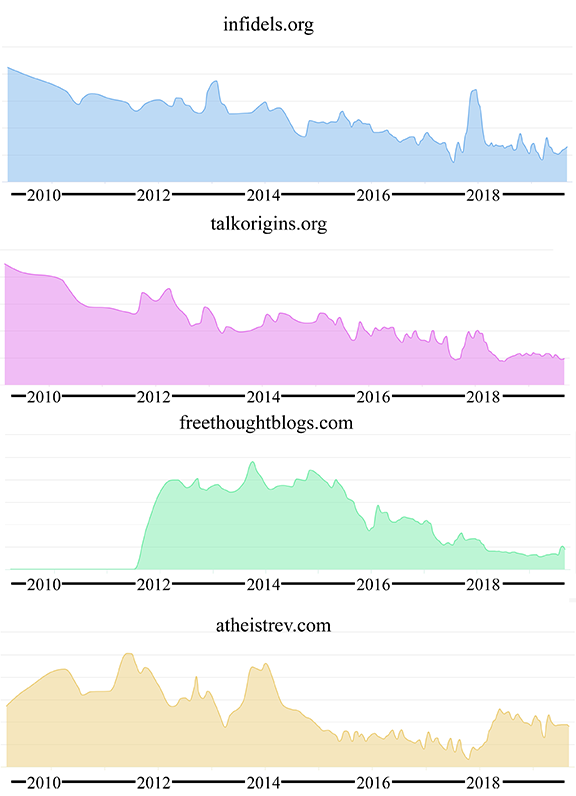
And it may not be Internet atheism per se, but here’s word frequency in the New York Times (source: New York Times Media Analytics):

I can’t figure out how to average the traffic numbers or the NYT frequencies, but here’s an average of all the atheism-related search terms:

I think these graphs mostly tell the same story. Unlike the continuous trend in religiosity, the atheist movement appears to be going strong throughout the 2000s, peak in 2012, and start declining shortly afterward.
But this hides a division into two different patterns. Two keywords (“creationism” and “Biblical contradictions”) and two websites (Talk Origins and Internet Infidels) are declining throughout the time period measured. Three keywords (“atheist”, “agnostic”, “freethinker”), two websites (Freethought Blogs and Atheist Revolution), and the New York Times frequencies are increasing through most of the period, peak around 2012, stay strong for a few years after that, and decline around 2016.
To get an intuitive feel for the first category, look at the two sites involved. Talk Origins is almost perfectly preserved, a time capsule from an era when people really wanted to debate creationism. Internet Infidels has decayed a bit more, but even its ruins are impressive: a database of forty videotaped atheist-vs-theist debates, an online library of uploaded works by about two hundred atheist authors, and the obligatory list of several hundred Biblical contradictions. Who does that these days?
This exercise is gradually bringing back memories of just how intellectual the Internet was around the turn of the millennium. You would go to bulletin boards, have long and acrimonious debates over whether or not the Gospels were based on pagan myths. Then someone would check Vast Apologetics Library tektonics.org and repost every one of their twenty-eight different articles about all the pagan myths the Gospels weren’t based on, from Adonis (“yet another unprofitable proposition for the copycat theorist”) to Zalmoxis (“there is no comparison, other than by illicit collapsing of terminology and by unsubstantiated speculation”). Both sides had these vast pre-built armories full of facts and arguments to go to.
At some point, in a way unrelated to the fall of New Atheism, the Internet stopped being like this. The topics that interest people today don’t get debated in the same way. People dunk on each other on Twitter, occasionally even have back-and-forth exchanges, but the average person doesn’t post long screeds and get equally long responses fisking each of their points. There’s less need for giant databases containing every fact you might need to win a particular argument, organized Dewey-Decimal-style by which argument you are trying to win. People just stopped caring.
I’m not sure why this happened. Maybe it took about ten years from the founding of the Internet for people to really internalize that online arguments didn’t change minds. The first Internet pioneers, starting their dial-up modems and running headfirst into people outside their filter bubbles, must have been so excited. For the first time in human history, people interested in debating a subject could do so 24-7 out in a joint salon-panopticon with all of the information of the human race at their fingertips. Bible Belt churchgoers for whom atheists had been an almost-fictional bogeyman, and New York atheists who thought of the religious as unsophisticated yokels, came together for the first time thinking “Convincing these people is going to be so easy”. The decade or so before they figured out that it wasn’t was a magical time, of which the great argument-arsenals of the past are almost the only remaining monument.
Or maybe it was something else. Maybe it was that getting online was actually pretty hard in those days, you needed to be technically inclined or attending a college or both, and so netizens were just more educated. Maybe the sort of people who interrupt any attempt at intellectual discussion with words like “rationalbro” or “mansplaining” or “well acktually” were still stuck in their caves, fruitlessly banging AOL CDs against rocks trying to create fire. Maybe it was something as simple as Wikipedia not existing yet, leaving the intellectual world in a sort of state of nature with every man for himself. Maybe it was just that the bulletin board format was more conducive to this than the later social media style fora.
Whatever it was, the decline of this culture started no later than 2000, and is reflected in the fate of argument-related search terms like “biblical contradictions” and “creationism”, and in the fading of the great argument-armories like Talk Origins and Infidels.
But the “atheism” search term keeps rising for another decade. What happened?
The intellectuals were succeeded by the activists. Early Internet Argument Culture disappeared and was replaced by something more familiar.

The atheists of Early Internet Argument Culture were not New Atheists. The term “New Atheism” didn’t really catch on until about 2006 when Richard Dawkins published The God Delusion; Early Internet Argument Culture was just a prelude to the main event. Post-2006 atheists were brasher and more political. They were less interested in arguing with religious people about the minutiae of carbon-dating; they were more interested in posting about how stupid carbon-dating denalists were, on their own social media feeds, read entirely by other atheists. The concept of the Internet as magical place where you could change other people’s minds had given way to the Internet as magical place where you could complain to like-minded friends about how ignorant other people were.
EIAC had been timeless, examining the medieval kalam argument and the Scopes Monkey Trial with equal detachment. New Atheism was ephemeral, obsessed with the issue of the day. This was in the mid-Bush administration, after the post-9/11 spirit of national unity had disappeared. Democrats had not yet invented the hashtag #Resistance, but they had invented the spirit. George W. Bush was portrayed as a religious fanatic, basing his every decision on what he considered to be the will of God. His supporters were evangelicals, willing to follow him into any war or disaster out of blind faith. A lot of the debate centered on faith-based charities, Bush’s push to give government funding to religiously-affiliated groups like the Salvation Army. It was assumed that they would preferentially serve Christians, leaving Jews, Muslims, and atheists without aid. Once Bush had shifted all welfare into these programs, non-Christians would die in the cold, and the government would laugh evilly. Every day brought new perspectives on this and a host of similar anti-religious activist causes.
New Atheism was also more centralized. EIAC was every man for himself; you would march forth alone into your chosen bulletin board and engage, neither seeking or receiving any help beyond precooked arguments from your local armory-site. New Atheism, for the first time, started to have celebrities. Richard Dawkins, of course, and the Four Horsemen, but also random bloggers like PZ Myers and Stephanie Zvan. These were the days when bloggers filled auditoria and travelled in high-altitude balloons. Every day they would tell you the latest reason to be outraged about religion, and every day you would discuss it on social media and comment sections and get appropriately angry.
This corresponds to the peak of Freethought Blogs on the traffic graph above, and ended around 2016. What happened to it?
I think it seamlessly merged into the modern social justice movement.
This probably comes as a surprise, seeing as how everyone else talks about how atheists are heavily affiliated with the modern anti-social justice movement. I think that’s the wrong takeaway. Sure, a lot of people who identify as atheists now are pretty critical of social justice. That’s because the only people remaining in the atheist movement are the people who didn’t participate in the mass transformation into social justice. It is no contradiction to say both “Most of the pagans you see around these days are really opposed to Christianity” and “What ever happened to all the pagans there used to be? They all became Christian.”
Somebody should make this case more exhaustively, but the highlight will no doubt be all the discussion around Atheism Plus, the brand name for a combination of “atheism plus social justice” which in a few years became entirely social justice. According to the original manifesto:
Within a week, it got glowing articles in the mainstream press, from New Statesman to Salon to The Guardian (consider how weird it sounds today for a post by a mid-tier atheist blog post to result in a bunch of mainstream press articles) and support from top atheist blogging celebrities. A review a week later wrote:
Famous atheist blogger PZ Myers embraced the new label and said that “atheism ought to be a progressive social movement in addition to being a scientific and philosophical position” and that:
Richard Carrier, an academic and another of the most famous New Atheists, told atheists who objected to the rebranding that:
I don’t want to dwell on this too much. I don’t have a great sense of how this era went, since it was around the time I unfollowed every atheist blog and forum for the sake of my own sanity, but my impression is that some of the Atheism Plussers later admitted they came on a little too strong and dropped that particular branding. But the cleavage the incident highlighted (not created, but highlighted) stuck around. As far as I can tell, it eventually ended with the anti-social-justice atheists stomping off to YouTube or somewhere horrible like that, while most of the important celebrity members of the public-facing movement very gradually turned into social justice bloggers.
For example, I look at Pharyngula, which during its heyday was the biggest atheist blog on the Internet. On the day I am writing this, its front page contains posts like “Are They All Racists On The Right Side Of The Aisle?” (recommended answer: yes), a discussion of how opposing the Gilette commercial represents “classic toxic masculinity”, and an attack on Milo Yiannopoulos. Its sidebar includes links to “Discussion: Racism In America”, “Discussion: Through A Feminist Lens”, and “Social Justice Links Roundup”. There’s still a little bit of anti-religious content, but mostly in the context of Catholics being racist and misogynist.
Aside from Pharyngula, a lot of the old atheist blogs have ended up at atheism-blogging-mega-nexus-site The Orbit. When I read its About page, it doesn’t even describe itself as an atheist blogging site at all. It says:
It’s not “blogs on atheism” anymore. It’s “blogs by atheists about social justice”. The whole atheist movement is like this.
One post I distinctly remember, but which I can no longer find, was a rousing call for atheists to switch to social justice blogging. It said something like “Instead of rehearsing the same old tired arguments for or against the existence of God, it’s time to become part of the struggle for progress and equality.”
I wish I could find this, because the sentiment it expresses is so bizarre that I worry you won’t believe me when I say it exists. Like, yes, the arguments for and against the existence of God are old and tired. Just like, for example, the arguments for and against restrictions on abortion. But if one day all of the top pro-choice activists agreed among themselves that what the pro-choice movement was really about was stopping Brexit – and they all posted supportive messages like “We’re tired of being known as those boring busybodies who go on about fetus this and right-to-your-own-body that when millions of people could be harmed by Britain’s ill-advised and bungled exit from the European Union” – and if from that day forward NARAL and Planned Parenthood were 100% Brexit-related organizations – surely we would find it strange? Surely we would think something deeper had to be going on?
I think of this as the second part of the mystery around New Atheism’s decline: why did a successful social movement so quietly and complacently agree to turn into a totally different social movement?
III.
My solution to both these questions is: New Atheism was a failed hamartiology.
“Hamartiology” is a subfield of theology dealing with the study of sin, in particular, how sin enters the universe. Orthodox Christian hamartiology says we all have original sin because Adam and Eve ate the apple. Gnostic hamartiologies say we sin because we are ignorant of our true nature as celestial beings. Some heretical hamartiologies say that all of this is irrelevant, and we sin because we choose to.
The rise of the Internet broadened our intellectual horizons. We got access to a whole new world of people with totally different standards, norms, and ideologies opposed to our own. When the Internet was small and confined to an optimistic group of technophile intellectuals, this spawned Early Internet Argument Culture, where we tried to iron out our differences through Reason. We hoped that the new world the Web revealed to us could be managed in the same friendly way we managed differences with our crazy uncle or the next-door neighbor.
As friendly debate started feeling more and more inadequate, and as newer and less nerdy people started taking over the Internet, this dream receded. In its place, we were left with an intolerable truth: a lot of people seem really horrible, and refuse to stop being horrible even when we ask them nicely. They seem to believe awful things. They seem to act in awful ways. When we tell them the obviously correct reasons they should be more like us, they refuse to listen to them, and instead spout insane moon gibberish about how they are right and we are wrong.
I can only describe this experience from my own side of the aisle, which was the progressive side. We watched the US population elect George W Bush and act like this was a remotely reasonable thing to do. We saw people destroying the environment, leaving the poor to starve, and denying gay people their right to live as normal members of society. We saw people endorsing weird ideas and conspiracy theories, from homeopathy and creationism to the Clintons murdering their enemies. We were always vaguely aware from reading the newspapers that some of these people existed. But now we were seeing and conversing with them every day.
Not only were we noticing the trend for the first time, but the trend itself was strengthening. I could use any of a hundred images to make this case, but for today I’ll use these:
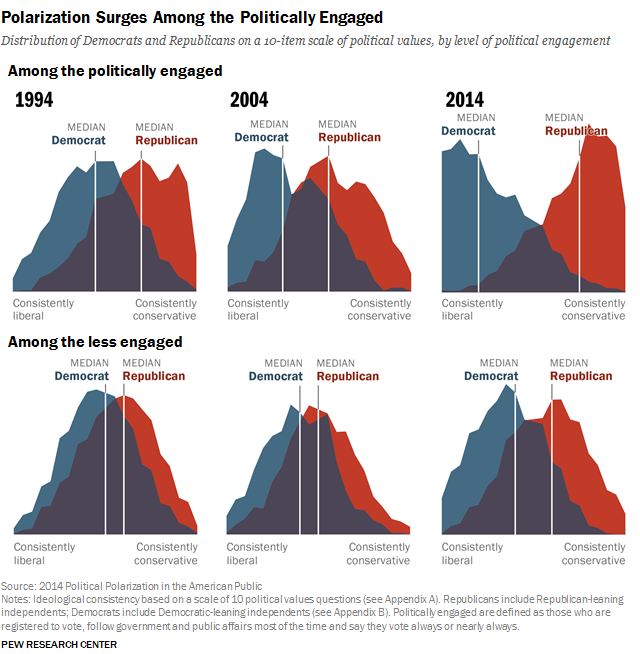
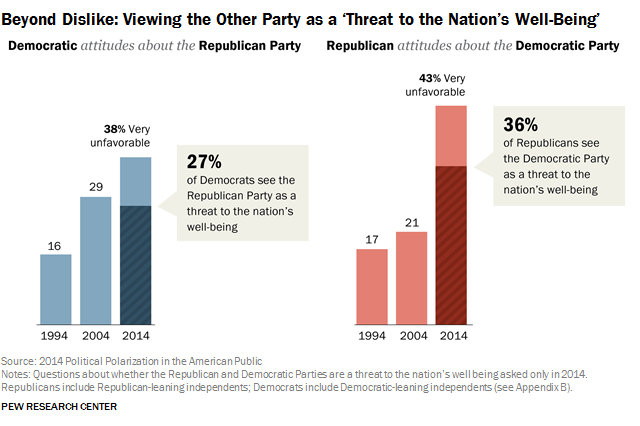
And so we asked ourselves: what the hell is wrong with these people?
And New Atheism had an answer: religion.
That was it. It was beautiful, it was simple, it was perfect. We were the “reality-based community”. They were ignoring Reason and basing all of their opinions on three thousand year old fairy-tales because people told them they would burn in Hell forever if they didn’t. There was nothing confusing or unsettling at all about the situation, and we did not need to question any of our own beliefs. It was just that some people had been brainwashed by their church/mosque/synagogue to believe transparently wrong things, so they did. Sin began with the apple tree in Eden; conservatism began with the Bible in Jerusalem. Language separates us from the apes; not being blinded by religion separates us from the Republicans.
This was a socially momentous proposal. The Democratic Party is centuries old, but the Blue Tribe – the Democratic Party as a social phenomenon with strong demographic and ideological implications – can be said to have started in 2004.
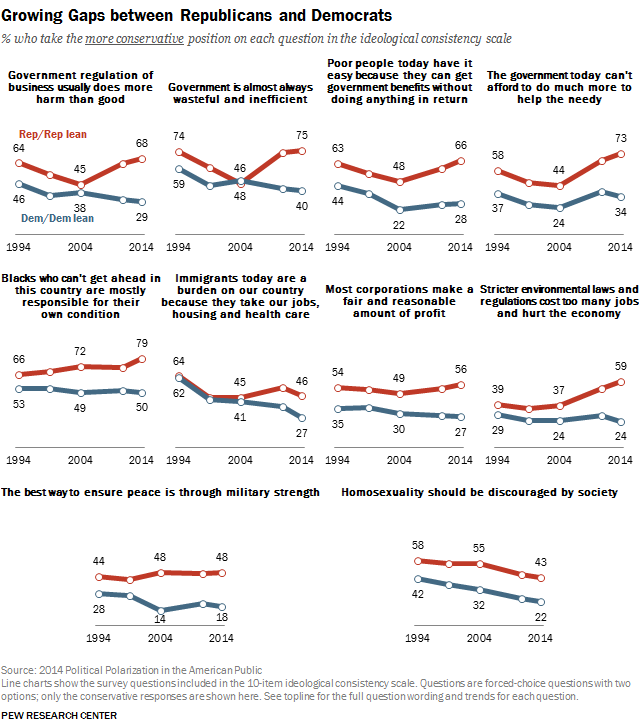
As it took its first baby steps, the Blue Tribe started asking itself “Who am I? What defines me?”, trying to figure out how it conceived of itself. New Atheism had an answer – “You are the people who aren’t blinded by fundamentalism” – and for a while the tribe toyed with accepting it. During the Bush administration, with all its struggles over Radical Islam and Intelligent Design and Faith-Based Charity, this seemed like it might be a reasonable answer. The atheist movement and the network of journalists/academics/pundits/operatives who made up the tribe’s core started drifting closer together.
Gradually the Blue Tribe got a little bit more self-awareness and realized this was not a great idea. Their coalition contained too many Catholic Latinos, too many Muslim Arabs, too many Baptist African-Americans. Remember that in 2008, “what if all the Hispanic people end up going Republican?” was considered a major and plausible concern. It became somewhat less amenable to New Atheism’s answer to its identity question – but absent a better one, the New Atheists continued to wield some social power.
Betweem 2008 and 2016, two things happened. First, Barack Obama replaced George W. Bush as president. Second, Ferguson. The Blue Tribe kept posing its same identity question: “Who am I? What defines me?”, and now Black Lives Matter gave them an answer they liked better “You are the people who aren’t blinded by sexism and racism.”
Again, it was beautiful, simple, and perfect. We were “the reality-based community”. They were ignoring Reason and basing all of their opinions on blind hatred and prejudice. There was nothing confusing or unsettling at all about the situation, and we did not need to question any of our own beliefs. It was just that some people had been brainwashed by white supremacy and an all-consuming desire to protect their own privilege, and so they did. Sin began with the apple tree in Eden; conservativism began with the cotton plant in Jamestown. Language separates us from the apes; not being blinded by bigotry separates us from the Republicans.
Since I started writing this essay, I’ve noticed a surprising number of people just saying this outright. If you go to any thread on r/politics about Trump (aka any thread on r/politics), you’ll see people saying things like this:
Google Trends shows traffic for atheism-related terms starting to decline around 2012, and really plummeting around 2015. How were other terms doing around that time?
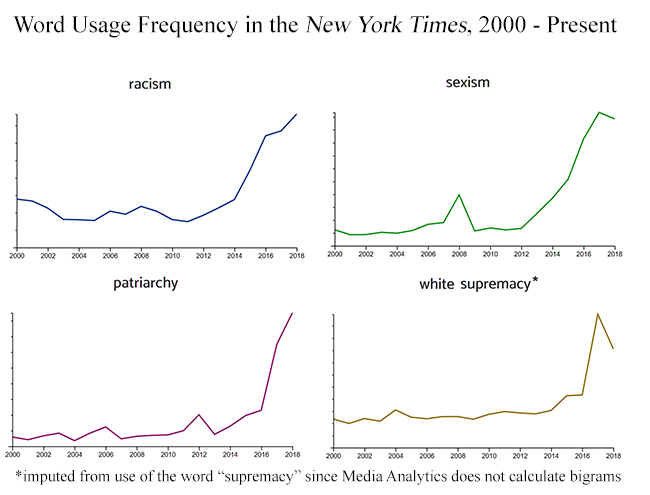
Not enough for you? We can go deeper:
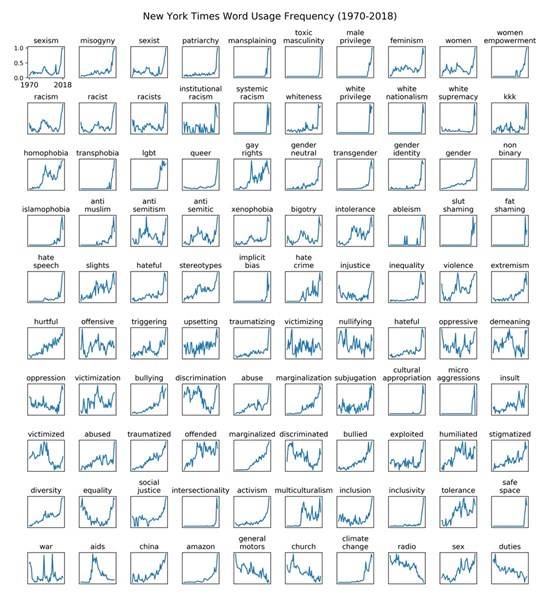
Most movement atheists weren’t in it for the religion. They were in it for the hamartiology. Once they got the message that the culture-at-large had settled on a different, better hamartiology, there was no psychological impediment to switching over. We woke up one morning and the atheist bloggers had all quietly became social justice bloggers. Nothing else had changed because nothing else had to; the underlying itch being scratched was the same. They just had to CTRL+F and replace a couple of keywords.
Eventually, things came full circle. I started this essay with a memory of noticing that my favorite early-2000s-era website had two off-topic forums: one for religion vs. atheism, and one for everything else. Earlier this year, SSC’s subreddit split in two: one for “culture war” discussions mostly about race and gender, the other for everything else.
Where do we go from here? I’m not sure. The socialist wing of the Democratic Party seems to be working off a model kind of like this, but hoping to change the hamartiology from race/gender to class. Maybe they’ll succeed, and one day talking too much about racism will seem as out-of-touch as talking too much about atheism does now; maybe the rise of terms like “woke capitalism” is already part of this process.
I’ve lost the exact quote, but a famous historian once said that we learn history to keep us from taking the present too seriously. This isn’t to say the problems of the present aren’t serious. Just that history helps us avoid getting too dazzled by current trends, or too swept away by any particular narrative.
If this is true, we might do well to study the history of New Atheism a little more seriously.
Back in those days, even some quite right-wing White heterosexual males could pretend to be edgy by attacking religion (as even Fade the Butcher did in one of his phases), but now that the Left is becoming more and more openly anti-White, pale-skinned infidels like Richard Dawkins are no longer hip or welcome in the radical Progressive scene:
https://slatestarcodex.com/2019/10/3...s-that-failed/
New Atheism: The Godlessness That Failed
Thucydides predicted that future generations would underestimate the power of Sparta. It built no great temples, left no magnificent ruins. Absent any tangible signs of the sway it once held, memories of its past importance would sound like ridiculous exaggerations.
This is how I feel about New Atheism.
If I were to describe the power of New Atheism over online discourse to a teenager, they would never believe me. Why should they? Other intellectual movements have left indelible marks in the culture; the heyday of hippiedom may be long gone, but time travelers visiting 1969 would not be surprised by the extent of Woodstock. But I imagine the same travelers visiting 2005, logging on to the Internet, and holy @#$! that’s a lot of atheism-related discourse what is going on here?
My first forays onto the Internet were online bulletin boards about computer games. They would have a lot of little forums about various aspects of the games, plus two off-topic forums. One for discussion of atheism vs. religion. And the other for everything else. This was a common structure for websites in those days. You had to do it, or the atheism vs. religion discussions would take over everything. At the time, this seemed perfectly normal.
In 2005, a college student made a webpage called The Church Of The Flying Spaghetti Monster. It was a joke based on the idea that there was no more scientific evidence for God or creationism than for belief in a flying spaghetti monster. The monster’s website received tens of millions of visitors, 60,000 emails (“about 95 percent” supportive), and was covered in The New York Times, The Washington Post, and The Daily Telegraph. Six publishing companies entered a bidding war for the rights to the spaghetti monster’s “gospel”, with the winner, Random House, offering an $80,000 advance. The book was published to massive fanfare, sold over 100,000 copies, and was translated into multiple languages. Putin’s thugs broke up a pro-Flying-Spaghetti-Monster demonstration in Russia. At the time, this seemed perfectly normal.
People compiled endless lists of arguments and counterarguments for or against atheism. The Talk.Origins newsgroup created a Dewey-Decimal-system-esque index of almost a thousand creationist arguments, from CA211.1 (“Karl Popper said that Darwinism is not testable”), to CD011.1 (“Variable C-14/C-12 ratio invalidates carbon dating”), through CH508 (“Chinese treasure ships show Noah’s Ark was feasible”) – and painstakingly debunked all of them; in case that wasn’t enough they linked 133 other sites doing similar work. Their arch-enemies, creationist site True.Origin, then went through and debunked all of their debunkings. Another atheist group created the Skeptics’ Annotated Bible, a version of the Bible highlighting everything bad or wrong in it. For example, if for some reason you need a hit job on the second chapter of the Book of Malachi in particular, you can look up its SAB page and find that Malachi 2:11 castigates Judah for “marrying the daughter of a strange god” (which is intolerant), Malachi 2:17 accuses the Israelites of “wearying the Lord with your words”, (which is absurd since God cannot be wearied), and Malachi 2:3 says that God will spread dung upon the faces of unbelievers (which is gross). This last entry includes a link to a 2007 YouTube video “God Wants To Smear Dung On Your Face” with 21,947 views. And the video links to a store selling Malachi-2:3-says-God-wants to-put-dung-on-your-face-related t-shirts, bumper stickers, keychains, and coffee mugs. At the time, this seemed perfectly normal.
Whatever media you liked, there were atheism-themed versions of it. Obviously if you liked webcomics you would never be able to finish all the different atheist options from Russell’s Teapot through Jesus & Mo through The Sheeples. If you liked TV, there were atheist TV shows like John Safran vs. God or The Atheist Experience. If you liked pithy quotes, you could read the top 10,000 atheist quotations in order of popularity. If you just liked discussion, you could go to the now-infamous r/atheism subreddit, which at the time was one of Reddit’s highest-ranked, beating topics like “news”, “humor”, and – somehow – “sex”. At the time, this seemed perfectly normal.
But these still don’t quite make my point, because the defining feature of this period wasn’t just that there were a lot of atheism-focused things. It was how the religious-vs-atheist conflict subtly bled into everything. Read enough old articles and blogs from this period and you’ll spot it. Some travel writer going on about how the boring small town he ended up in is probably full of fundies who hate gays and think the Earth is six thousand years old. Some logician giving an example of circular arguments: “I know the Bible is true because it says so in the Bible.” Some political writer saying a stupid policy is only to be expected in a country where X% of people still get their ethics from Bronze Age superstitions. At the time, this seemed perfectly normal.
It seemed perfectly normal because religion vs. atheism was the most important issue, maybe the only issue. How could you run a 21st century democracy with half the population believing in science and compassion, and the other half believing whatever they read in a 3000 year old book about a magic sky father? To truly understand the spirit of the time, you can’t just think of religion as evil. You have to think of it as the ur-evil, without which no other evil would exist. Homophobia? Only there because the Bible says to stone gay people. War? It’s all holy war of one sort or another, whether it’s Arabs vs. Israelis, Sunnis vs. Shias, or the Christian/Muslim “clash of civilizations”. Environmental devastation? Only there because religious people believe God elevated Adam over the animals and told him to exploit them for his own purposes. Poverty? Only because religious people believe in the prosperity gospel that says people get what they deserve.
Christopher Hitchens, 2008:
Now, I am absolutely convinced that the main source of hatred in the world is religion and organized religion. Absolutely convinced of that. And I think it should be—religion—treated with ridicule, hatred, and contempt. And I claim that right. So when I say—as the subtitle of my book—that I think religion poisons everything, I’m not just doing what publishers like and coming up with a provocative subtitle. I mean to say it infects us in our most basic integrity. It says we can’t be moral without ‘Big Brother,’ without a totalitarian permission, means we can’t be good to one another without this, we must be afraid, we must also be forced to love someone whom we fear—the essence of sadomasochism, the essence of abjection, the essence of the master-slave relationship and that knows that death is coming and can’t wait to bring it on. I say that is evil, and though I do, some nights, stay home, I enjoy more the nights when I go out and fight against this ultimate wickedness and ultimate stupidity.
Where did this come from? And where did it go?
At the time, the question of where it came from seemed to have an obvious answer. As a civilization becomes advanced enough that some people throw off the yoke of religion, they will naturally come into conflict with people who have not thrown off that yoke. This will dominate discussion since atheism vs. religion is obviously the most important issue and maybe the only issue, and last until the civilization advances enough that religion disappears.
But the past decade or so has shown that advanced civilizations are perfectly capable of containing atheists and religious people in close proximity without either side caring that much about it. So what made the turn of the millennium such an acrimonious period?
As for where it went, I asked that question last year and got various responses. The most popular was that 9/11 made religion-bashing segue into Islam-bashing, which started to look pretty racist. But 9/11 happened in 2001, The God Delusion wasn’t published until 2006, and New Atheism didn’t peak until the early 2010s. Why?
In order to answer these questions, I’ll start by presenting some data confirming the picture I paint above and trying to pinpoint exactly when the peak and the beginning of the end happened. I’ll move on to some of the intellectual subtrends in New Atheism that might explain the picture a little better. And finally, I’ll present my theory explaining the mysteries above: New Atheism was a failed hamartiology.
II.
Here is a graph of US religiosity over time:

Between the first stirrings of internet atheism in 2000 and the beginning of the end in 2015, the percent of Americans identifying as Christian dropped about 10%; the percent identifying as no religion increased about the same amount. There are many different ways of looking at the data: self-reported affiliation, church attendance, even polls on whether religion can answer all of today’s problems, but they all show the same story of slow, steady decline.
By the numbers, the decline is slight: from 80% Christian / 15% atheist in 2000 to 70% Christian / 25% atheist in 2018. This could hide wider social changes. The number of gay people has barely changed since 2000, but society’s attitude toward them has totally transformed. Likewise, although religion has barely declined, and nonbelief barely risen, Christianity no longer seems to command quite the same level of political power, nor does atheism provoke quite as much revulsion.
But the sudden fall of New Atheism didn’t feel like a process of gradual social change and eventual acceptance. It felt like a movement certain of its own victory burning out spectacularly over the course of a few short years, followed by mysterious yet near-total contempt from the very people it thought it had convinced.
Here are some graphs of atheism-related search terms on Google Trends since 2004:

And here are the traffic numbers for some atheism-related websites (source: http://rank2traffic.com/):

And it may not be Internet atheism per se, but here’s word frequency in the New York Times (source: New York Times Media Analytics):

I can’t figure out how to average the traffic numbers or the NYT frequencies, but here’s an average of all the atheism-related search terms:

I think these graphs mostly tell the same story. Unlike the continuous trend in religiosity, the atheist movement appears to be going strong throughout the 2000s, peak in 2012, and start declining shortly afterward.
But this hides a division into two different patterns. Two keywords (“creationism” and “Biblical contradictions”) and two websites (Talk Origins and Internet Infidels) are declining throughout the time period measured. Three keywords (“atheist”, “agnostic”, “freethinker”), two websites (Freethought Blogs and Atheist Revolution), and the New York Times frequencies are increasing through most of the period, peak around 2012, stay strong for a few years after that, and decline around 2016.
To get an intuitive feel for the first category, look at the two sites involved. Talk Origins is almost perfectly preserved, a time capsule from an era when people really wanted to debate creationism. Internet Infidels has decayed a bit more, but even its ruins are impressive: a database of forty videotaped atheist-vs-theist debates, an online library of uploaded works by about two hundred atheist authors, and the obligatory list of several hundred Biblical contradictions. Who does that these days?
This exercise is gradually bringing back memories of just how intellectual the Internet was around the turn of the millennium. You would go to bulletin boards, have long and acrimonious debates over whether or not the Gospels were based on pagan myths. Then someone would check Vast Apologetics Library tektonics.org and repost every one of their twenty-eight different articles about all the pagan myths the Gospels weren’t based on, from Adonis (“yet another unprofitable proposition for the copycat theorist”) to Zalmoxis (“there is no comparison, other than by illicit collapsing of terminology and by unsubstantiated speculation”). Both sides had these vast pre-built armories full of facts and arguments to go to.
At some point, in a way unrelated to the fall of New Atheism, the Internet stopped being like this. The topics that interest people today don’t get debated in the same way. People dunk on each other on Twitter, occasionally even have back-and-forth exchanges, but the average person doesn’t post long screeds and get equally long responses fisking each of their points. There’s less need for giant databases containing every fact you might need to win a particular argument, organized Dewey-Decimal-style by which argument you are trying to win. People just stopped caring.
I’m not sure why this happened. Maybe it took about ten years from the founding of the Internet for people to really internalize that online arguments didn’t change minds. The first Internet pioneers, starting their dial-up modems and running headfirst into people outside their filter bubbles, must have been so excited. For the first time in human history, people interested in debating a subject could do so 24-7 out in a joint salon-panopticon with all of the information of the human race at their fingertips. Bible Belt churchgoers for whom atheists had been an almost-fictional bogeyman, and New York atheists who thought of the religious as unsophisticated yokels, came together for the first time thinking “Convincing these people is going to be so easy”. The decade or so before they figured out that it wasn’t was a magical time, of which the great argument-arsenals of the past are almost the only remaining monument.
Or maybe it was something else. Maybe it was that getting online was actually pretty hard in those days, you needed to be technically inclined or attending a college or both, and so netizens were just more educated. Maybe the sort of people who interrupt any attempt at intellectual discussion with words like “rationalbro” or “mansplaining” or “well acktually” were still stuck in their caves, fruitlessly banging AOL CDs against rocks trying to create fire. Maybe it was something as simple as Wikipedia not existing yet, leaving the intellectual world in a sort of state of nature with every man for himself. Maybe it was just that the bulletin board format was more conducive to this than the later social media style fora.
Whatever it was, the decline of this culture started no later than 2000, and is reflected in the fate of argument-related search terms like “biblical contradictions” and “creationism”, and in the fading of the great argument-armories like Talk Origins and Infidels.
But the “atheism” search term keeps rising for another decade. What happened?
The intellectuals were succeeded by the activists. Early Internet Argument Culture disappeared and was replaced by something more familiar.

The atheists of Early Internet Argument Culture were not New Atheists. The term “New Atheism” didn’t really catch on until about 2006 when Richard Dawkins published The God Delusion; Early Internet Argument Culture was just a prelude to the main event. Post-2006 atheists were brasher and more political. They were less interested in arguing with religious people about the minutiae of carbon-dating; they were more interested in posting about how stupid carbon-dating denalists were, on their own social media feeds, read entirely by other atheists. The concept of the Internet as magical place where you could change other people’s minds had given way to the Internet as magical place where you could complain to like-minded friends about how ignorant other people were.
EIAC had been timeless, examining the medieval kalam argument and the Scopes Monkey Trial with equal detachment. New Atheism was ephemeral, obsessed with the issue of the day. This was in the mid-Bush administration, after the post-9/11 spirit of national unity had disappeared. Democrats had not yet invented the hashtag #Resistance, but they had invented the spirit. George W. Bush was portrayed as a religious fanatic, basing his every decision on what he considered to be the will of God. His supporters were evangelicals, willing to follow him into any war or disaster out of blind faith. A lot of the debate centered on faith-based charities, Bush’s push to give government funding to religiously-affiliated groups like the Salvation Army. It was assumed that they would preferentially serve Christians, leaving Jews, Muslims, and atheists without aid. Once Bush had shifted all welfare into these programs, non-Christians would die in the cold, and the government would laugh evilly. Every day brought new perspectives on this and a host of similar anti-religious activist causes.
New Atheism was also more centralized. EIAC was every man for himself; you would march forth alone into your chosen bulletin board and engage, neither seeking or receiving any help beyond precooked arguments from your local armory-site. New Atheism, for the first time, started to have celebrities. Richard Dawkins, of course, and the Four Horsemen, but also random bloggers like PZ Myers and Stephanie Zvan. These were the days when bloggers filled auditoria and travelled in high-altitude balloons. Every day they would tell you the latest reason to be outraged about religion, and every day you would discuss it on social media and comment sections and get appropriately angry.
This corresponds to the peak of Freethought Blogs on the traffic graph above, and ended around 2016. What happened to it?
I think it seamlessly merged into the modern social justice movement.
This probably comes as a surprise, seeing as how everyone else talks about how atheists are heavily affiliated with the modern anti-social justice movement. I think that’s the wrong takeaway. Sure, a lot of people who identify as atheists now are pretty critical of social justice. That’s because the only people remaining in the atheist movement are the people who didn’t participate in the mass transformation into social justice. It is no contradiction to say both “Most of the pagans you see around these days are really opposed to Christianity” and “What ever happened to all the pagans there used to be? They all became Christian.”
Somebody should make this case more exhaustively, but the highlight will no doubt be all the discussion around Atheism Plus, the brand name for a combination of “atheism plus social justice” which in a few years became entirely social justice. According to the original manifesto:
We are…
Atheists plus we care about social justice,
Atheists plus we support women’s rights,
Atheists plus we protest racism,
Atheists plus we fight homophobia and transphobia,
Atheists plus we use critical thinking and skepticism…
Religion is responsible for generating and sustaining most of the racism, sexism, anti-(insert minority human subgroup here)-isms… it gave a voice to the bigotry, established the privilege, and fed these things from the pulpit for thousands upon thousands of years. What sense does it make to throw out the garbage bag of religion yet keep all the garbage that it contained? I can’t help but see social justice as a logical consequence of atheism. I’m for getting rid of all the garbage.
Within a week, it got glowing articles in the mainstream press, from New Statesman to Salon to The Guardian (consider how weird it sounds today for a post by a mid-tier atheist blog post to result in a bunch of mainstream press articles) and support from top atheist blogging celebrities. A review a week later wrote:
Last week, Jen McCreight announced that she was fed up with sexism in the atheist movement and called for a new wave of atheist activism, one explicitly concerned with social justice, which quickly acquired the name “atheism+”.
These posts landed like a cannon shell, generating a huge wave of excitement and feedback – the vast majority of which, to my surprise, was positive and enthusiastic.Clearly, they’ve tapped into a powerful vein of pro-equality sentiment in the atheist movement, crystallizing the frustrations that those of us who care about this have been feeling for the last year or two. This is an idea whose time has come, and all it needed were some excellent posts like Jen’s to kickstart it.
Famous atheist blogger PZ Myers embraced the new label and said that “atheism ought to be a progressive social movement in addition to being a scientific and philosophical position” and that:
If you don’t agree with any of that — and this is the only ‘divisive’ part — then you’re an asshole. I suggest you form your own label, “Asshole Atheists” and own it, proudly. I promise not to resent it or cry about joining it.
Richard Carrier, an academic and another of the most famous New Atheists, told atheists who objected to the rebranding that:
Atheism+ is our movement. We will not consider you a part of it, we will not work with you, we will not befriend you. We will heretofore denounce you as the irrational or immoral scum you are (if such you are). If you reject these values, then you are no longer one of us. And we will now say so, publicly and repeatedly. You are hereby disowned.
I don’t want to dwell on this too much. I don’t have a great sense of how this era went, since it was around the time I unfollowed every atheist blog and forum for the sake of my own sanity, but my impression is that some of the Atheism Plussers later admitted they came on a little too strong and dropped that particular branding. But the cleavage the incident highlighted (not created, but highlighted) stuck around. As far as I can tell, it eventually ended with the anti-social-justice atheists stomping off to YouTube or somewhere horrible like that, while most of the important celebrity members of the public-facing movement very gradually turned into social justice bloggers.
For example, I look at Pharyngula, which during its heyday was the biggest atheist blog on the Internet. On the day I am writing this, its front page contains posts like “Are They All Racists On The Right Side Of The Aisle?” (recommended answer: yes), a discussion of how opposing the Gilette commercial represents “classic toxic masculinity”, and an attack on Milo Yiannopoulos. Its sidebar includes links to “Discussion: Racism In America”, “Discussion: Through A Feminist Lens”, and “Social Justice Links Roundup”. There’s still a little bit of anti-religious content, but mostly in the context of Catholics being racist and misogynist.
Aside from Pharyngula, a lot of the old atheist blogs have ended up at atheism-blogging-mega-nexus-site The Orbit. When I read its About page, it doesn’t even describe itself as an atheist blogging site at all. It says:
The Orbit is a diverse collective of atheist and nonreligious bloggers committed to social justice, within and outside the secular community. We provide a platform for writing, discussion, activism, collaboration, and community.
It’s not “blogs on atheism” anymore. It’s “blogs by atheists about social justice”. The whole atheist movement is like this.
One post I distinctly remember, but which I can no longer find, was a rousing call for atheists to switch to social justice blogging. It said something like “Instead of rehearsing the same old tired arguments for or against the existence of God, it’s time to become part of the struggle for progress and equality.”
I wish I could find this, because the sentiment it expresses is so bizarre that I worry you won’t believe me when I say it exists. Like, yes, the arguments for and against the existence of God are old and tired. Just like, for example, the arguments for and against restrictions on abortion. But if one day all of the top pro-choice activists agreed among themselves that what the pro-choice movement was really about was stopping Brexit – and they all posted supportive messages like “We’re tired of being known as those boring busybodies who go on about fetus this and right-to-your-own-body that when millions of people could be harmed by Britain’s ill-advised and bungled exit from the European Union” – and if from that day forward NARAL and Planned Parenthood were 100% Brexit-related organizations – surely we would find it strange? Surely we would think something deeper had to be going on?
I think of this as the second part of the mystery around New Atheism’s decline: why did a successful social movement so quietly and complacently agree to turn into a totally different social movement?
III.
My solution to both these questions is: New Atheism was a failed hamartiology.
“Hamartiology” is a subfield of theology dealing with the study of sin, in particular, how sin enters the universe. Orthodox Christian hamartiology says we all have original sin because Adam and Eve ate the apple. Gnostic hamartiologies say we sin because we are ignorant of our true nature as celestial beings. Some heretical hamartiologies say that all of this is irrelevant, and we sin because we choose to.
The rise of the Internet broadened our intellectual horizons. We got access to a whole new world of people with totally different standards, norms, and ideologies opposed to our own. When the Internet was small and confined to an optimistic group of technophile intellectuals, this spawned Early Internet Argument Culture, where we tried to iron out our differences through Reason. We hoped that the new world the Web revealed to us could be managed in the same friendly way we managed differences with our crazy uncle or the next-door neighbor.
As friendly debate started feeling more and more inadequate, and as newer and less nerdy people started taking over the Internet, this dream receded. In its place, we were left with an intolerable truth: a lot of people seem really horrible, and refuse to stop being horrible even when we ask them nicely. They seem to believe awful things. They seem to act in awful ways. When we tell them the obviously correct reasons they should be more like us, they refuse to listen to them, and instead spout insane moon gibberish about how they are right and we are wrong.
I can only describe this experience from my own side of the aisle, which was the progressive side. We watched the US population elect George W Bush and act like this was a remotely reasonable thing to do. We saw people destroying the environment, leaving the poor to starve, and denying gay people their right to live as normal members of society. We saw people endorsing weird ideas and conspiracy theories, from homeopathy and creationism to the Clintons murdering their enemies. We were always vaguely aware from reading the newspapers that some of these people existed. But now we were seeing and conversing with them every day.
Not only were we noticing the trend for the first time, but the trend itself was strengthening. I could use any of a hundred images to make this case, but for today I’ll use these:


And so we asked ourselves: what the hell is wrong with these people?
And New Atheism had an answer: religion.
That was it. It was beautiful, it was simple, it was perfect. We were the “reality-based community”. They were ignoring Reason and basing all of their opinions on three thousand year old fairy-tales because people told them they would burn in Hell forever if they didn’t. There was nothing confusing or unsettling at all about the situation, and we did not need to question any of our own beliefs. It was just that some people had been brainwashed by their church/mosque/synagogue to believe transparently wrong things, so they did. Sin began with the apple tree in Eden; conservatism began with the Bible in Jerusalem. Language separates us from the apes; not being blinded by religion separates us from the Republicans.
This was a socially momentous proposal. The Democratic Party is centuries old, but the Blue Tribe – the Democratic Party as a social phenomenon with strong demographic and ideological implications – can be said to have started in 2004.

As it took its first baby steps, the Blue Tribe started asking itself “Who am I? What defines me?”, trying to figure out how it conceived of itself. New Atheism had an answer – “You are the people who aren’t blinded by fundamentalism” – and for a while the tribe toyed with accepting it. During the Bush administration, with all its struggles over Radical Islam and Intelligent Design and Faith-Based Charity, this seemed like it might be a reasonable answer. The atheist movement and the network of journalists/academics/pundits/operatives who made up the tribe’s core started drifting closer together.
Gradually the Blue Tribe got a little bit more self-awareness and realized this was not a great idea. Their coalition contained too many Catholic Latinos, too many Muslim Arabs, too many Baptist African-Americans. Remember that in 2008, “what if all the Hispanic people end up going Republican?” was considered a major and plausible concern. It became somewhat less amenable to New Atheism’s answer to its identity question – but absent a better one, the New Atheists continued to wield some social power.
Betweem 2008 and 2016, two things happened. First, Barack Obama replaced George W. Bush as president. Second, Ferguson. The Blue Tribe kept posing its same identity question: “Who am I? What defines me?”, and now Black Lives Matter gave them an answer they liked better “You are the people who aren’t blinded by sexism and racism.”
Again, it was beautiful, simple, and perfect. We were “the reality-based community”. They were ignoring Reason and basing all of their opinions on blind hatred and prejudice. There was nothing confusing or unsettling at all about the situation, and we did not need to question any of our own beliefs. It was just that some people had been brainwashed by white supremacy and an all-consuming desire to protect their own privilege, and so they did. Sin began with the apple tree in Eden; conservativism began with the cotton plant in Jamestown. Language separates us from the apes; not being blinded by bigotry separates us from the Republicans.
Since I started writing this essay, I’ve noticed a surprising number of people just saying this outright. If you go to any thread on r/politics about Trump (aka any thread on r/politics), you’ll see people saying things like this:
[Trump voters] know they are being lied to, well most of them do, but look at the increase of hatred in America. THAT is what they are voting on. Hatred. Ironically, the Republicans are a large reason why their lives are so shitty and full of hatred, but hatred nonetheless. I guarantee you, you debate any of these people long enough. You back them into a corner. They say the same thing. “We are winning. We won the election. Racism is good. Hatred is good. Cheating on elections is good as long as it’s my side.” Because that is what happens when one side is the Republicans and the other side is baby murdering, child raping and trafficking and harvesting drugs from their brain, brown and black people loving devil worshippers. Go on you know what sub. Read their posts. They will say, “I was driving by a school bus stop, none of them were white.” This makes them so angry. To them, Russia [is better than] Democrats. At least Russia is white.
Google Trends shows traffic for atheism-related terms starting to decline around 2012, and really plummeting around 2015. How were other terms doing around that time?

Not enough for you? We can go deeper:

Most movement atheists weren’t in it for the religion. They were in it for the hamartiology. Once they got the message that the culture-at-large had settled on a different, better hamartiology, there was no psychological impediment to switching over. We woke up one morning and the atheist bloggers had all quietly became social justice bloggers. Nothing else had changed because nothing else had to; the underlying itch being scratched was the same. They just had to CTRL+F and replace a couple of keywords.
Eventually, things came full circle. I started this essay with a memory of noticing that my favorite early-2000s-era website had two off-topic forums: one for religion vs. atheism, and one for everything else. Earlier this year, SSC’s subreddit split in two: one for “culture war” discussions mostly about race and gender, the other for everything else.
Where do we go from here? I’m not sure. The socialist wing of the Democratic Party seems to be working off a model kind of like this, but hoping to change the hamartiology from race/gender to class. Maybe they’ll succeed, and one day talking too much about racism will seem as out-of-touch as talking too much about atheism does now; maybe the rise of terms like “woke capitalism” is already part of this process.
I’ve lost the exact quote, but a famous historian once said that we learn history to keep us from taking the present too seriously. This isn’t to say the problems of the present aren’t serious. Just that history helps us avoid getting too dazzled by current trends, or too swept away by any particular narrative.
If this is true, we might do well to study the history of New Atheism a little more seriously.
Last edited:

